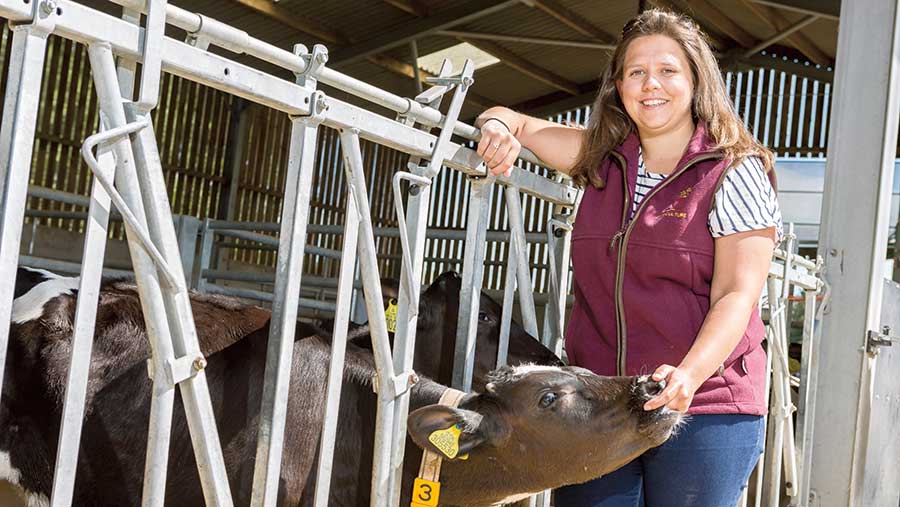Alex Dunn: Dyslexic farmers can succeed in a world of words
 Alex Dunn © Richard Stanton
Alex Dunn © Richard Stanton Last year Farmers Weekly shared the heartwarming story of Michael Balls – a man who refused to give up on his life ambition of being a farm manager, despite being told his severe dyslexia made his dream impossible.
Now young farmer Alex Dunn, our 2018 Ag Student of the Year, is opening up about her own dyslexia and outlines how those living with this learning difficulty can thrive in agriculture.

Alex Dunn © Richard Stanton
Resilience is our bread and butter
People often characterise dyslexia as simply a learning disability that affects reading and writing, but many fail to recognise the great strengths that an individual with dyslexia can possess.
A lifetime of surviving in a world of inaccessible words can create some exceptionally resilient and adaptive individuals, possessing the ability to find alternative solutions to problems in a uniquely creative way.
With the challenges facing the agricultural industry and the inevitable change that will need to occur, perhaps we as farmers, business owners and industry leaders need to think more outside the box, like people with dyslexia, to adapt and overcome.
See also: How experience outside of farming can advance your ag career
The working group Farming with Dyslexia, NFU Scotland, suggests that the rate of dyslexia is far higher in rural communities than in the general population.
Watch the Farming with Dyslexia mini-documentary below.
How can we, as an industry, use this source of entrepreneurs, inventors and problem-solvers?
To start with, let’s not limit people based on their ability to read and write, but use people for their ability to adapt and thrive.
After all, the industry is going to need to adapt quickly to its changing economic and legislative environment. We will need to collaborate, working together to ensure our businesses and our industry can be profitable and resilient after Brexit.
So let’s make sure we tap into everyone’s potential to produce our own solutions as an industry, instead of relying on the often ill-judged attempts made by government.
Strength in business
Everybody’s dyslexia is different and each individual has to establish their own way of surviving in a world of words.
It is crucial to ensure that the self-esteem of an individual with dyslexia is kept intact by remembering that difficulties experienced with reading and writing as a result of dyslexia are no reflection on intelligence.
People living with dyslexia have many strengths that make them great employers, employees and entrepreneurs across the agricultural industry.
I am severely dyslexic and with the aim of getting into farming, my discovery of assistive technology and the countless hours of my mum’s proofreading, I was successfully able to navigate school, college and even university – leaving with a first-class honours degree.
Two years ago, I was honoured to be named the Farmers Weekly Ag Student of the Year and I now have a fantastically varied job in farm diversification and public engagement.
Without technology such as my smartphone, I still struggle to read and write effectively; but thanks to key people in my life and a supportive work environment, I now view my dyslexia as more of a positive than a negative and really appreciate the gifts it has given me.
Not everyone is lucky enough to have dyslexia, so if you are, make the most of it, work passionately at what you are good at and turn problems into solutions.
You have so much to offer, so don’t be afraid to step out of your comfort zone to seize every opportunity.
Useful smartphone features and apps for people with dyslexia
Smartphones
- Have your phone read aloud selected text so you can hear emails, messages and even articles in the FW app. Turn this on in the accessibility section of settings
- Write with built-in voice recognition software to avoid mistakes and speed up typing
- Use reminders so you don’t forget important meetings or timings. This can let you know when and where you need to be with a pop-up notification.
Helpful apps
- Speechify (free version): Take a picture of text (like this page) and turn it into audio so you can access things like printed forms and instructions even if you can’t read them
- Hour-tracking apps: These help to avoid mistakes when calculating hours and turning them into invoices. Just press start and stop and it figures out the rest for you
- Find My iPhone: When you lose your phone this app, which works on all iOS devices, shows you its location – even in areas with little signal.
